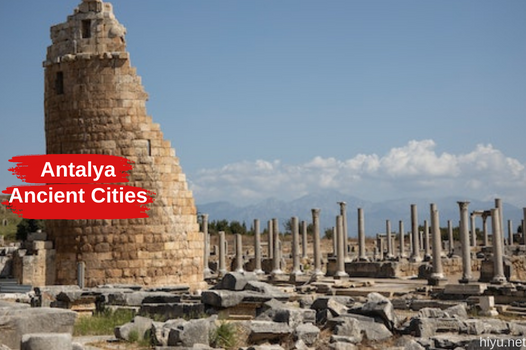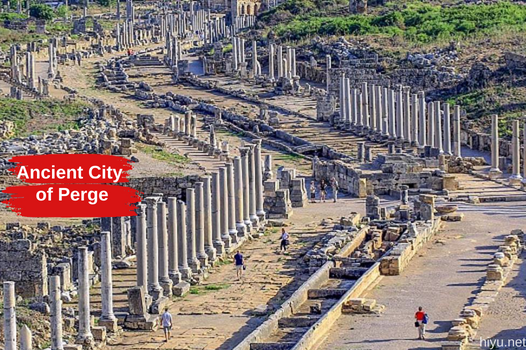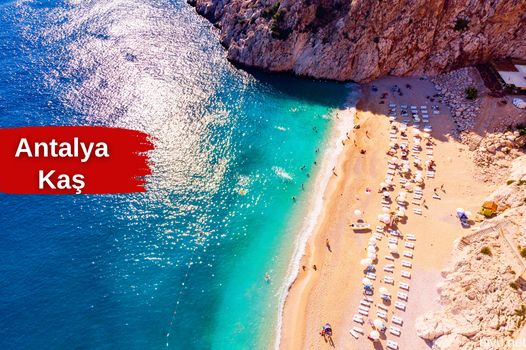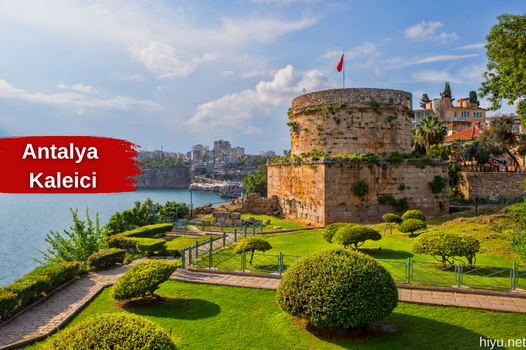Uncovering the Rich History of Antalya
Antalya, a vibrant city nestled on the picturesque shores of the Mediterranean Sea, holds a rich and diverse history that dates back to ancient times. Steeped in cultural heritage, the city has witnessed the rise and fall of civilizations throughout the centuries. From its ancient origins to its Roman heritage, Antalya has become a mosaic of influences. The Byzantine period further shaped its history, while its role in the Ottoman Empire added another layer to the city’s captivating story. Today, Antalya embraces modern developments and flourishes as a thriving tourist destination, attracting visitors from around the globe. Join us as we delve into the fascinating journey through time that is Antalya’s history.
The Ancient Origins Of Antalya
The ancient origins of Antalya take us back to the prehistoric times when the region was inhabited by various civilizations. The city, located on the southwestern coast of Turkey, has a rich and intriguing history that spans thousands of years. From the earliest settlements to the rise and fall of mighty empires, Antalya has witnessed it all.
The story of Antalya begins with the ancient Greeks, who established a trading post in the 2nd century BC. They called the city Attaleia, in honor of their king Attalus II. Under the Greeks, Attaleia flourished as an important port and a gateway to the East. However, the region’s history predates even the arrival of the Greeks.
Before the Greeks, the area was home to the Lycians, an indigenous Anatolian people. The Lycians had their own distinct culture and language, and their influence can still be seen in the ancient ruins scattered across Antalya. The most famous Lycian site is the impressive rock-cut tomb of King Amyntas, which dates back to the 4th century BC.
- Antalya has a rich and intriguing history
- From the earliest settlements to the rise and fall of mighty empires, Antalya has witnessed it all
- The city was called Attaleia by the ancient Greeks
- Before the Greeks, the region was inhabited by the Lycians
- The Lycians had their own distinct culture and language
The Romans also left their mark on Antalya’s history. In the 1st century BC, the city became part of the Roman Empire and prospered under Roman rule. The Romans built magnificent structures like the Hadrian’s Gate, which still stands as a testament to their architectural prowess. They also brought their advanced infrastructure and urban planning techniques, turning Antalya into a thriving metropolis.
| Keywords | Usage |
|---|---|
| Ancient Greeks | The Greeks established a trading post in Antalya in the 2nd century BC |
| Lycians | The Lycians were the indigenous people of the region before the Greeks |
| Romans | Antalya became part of the Roman Empire in the 1st century BC |
Throughout its history, Antalya has been a melting pot of civilizations, each leaving its unique imprint on the city. From the grandeur of ancient ruins to the vibrant streets of the modern city, Antalya is a treasure trove of culture and heritage. Exploring the ancient origins of Antalya is like stepping back in time, unraveling the layers of history that have shaped this beautiful coastal city.
Exploring Antalya’s Roman Heritage
Antalya, located on Turkey’s southwestern coast, is known for its rich history and cultural heritage. One of the most fascinating aspects of Antalya’s history is its Roman heritage. The city was originally founded by King Attalos II of Pergamon and was named Attaleia in his honor. During the Roman period, it flourished as a major port city and played a significant role in the region.
Antalya’s Roman heritage can be seen in its architectural gems and historical sites. One of the most iconic landmarks is the Hadrian’s Gate, built in the 2nd century AD in honor of the Roman Emperor Hadrian. This well-preserved monumental arch marks the entrance to the old city and serves as a reminder of Antalya’s ancient past.
Another important Roman site in Antalya is the ancient theater, which dates back to the 2nd century AD. This well-preserved amphitheater once hosted various performances and seated up to 15,000 spectators. Today, visitors can explore the theater and imagine the grandeur of ancient Roman entertainment.
- The Ancient Origins Of Antalya: Antalya’s history stretches back to ancient times, with evidence of human settlement dating back to the Paleolithic period. Throughout its long history, the city has been influenced by various civilizations and empires, leaving behind a rich cultural tapestry.
- The Byzantine Influence On Antalya’s History: The Byzantine Empire played a significant role in shaping Antalya’s history. The city was a strategically important stronghold for the Byzantines, who built impressive fortifications and churches that still stand today.
- Antalya’s Role In The Ottoman Empire: During the Ottoman Empire, Antalya became an important trade center and a hub for textile production. The Ottomans left their mark on the city with the construction of stunning mosques, such as the Yivli Minaret.
- Modern Developments And Tourism In Antalya: In recent decades, Antalya has experienced rapid growth and development, particularly in the tourism sector. The city is now a popular holiday destination, attracting visitors from around the world with its stunning beaches, vibrant nightlife, and rich cultural heritage.
| Historical Period | Key Features |
|---|---|
| Roman | Hadrian’s Gate, ancient theater |
| Byzantine | Fortifications, churches |
| Ottoman | Mosques, trade center |
| Modern | Tourism, beaches, nightlife |
Exploring Antalya’s Roman heritage is like stepping back in time. The city’s ancient ruins and historical sites offer a glimpse into the past, allowing visitors to immerse themselves in the rich history and culture of this enchanting destination.
The Byzantine Influence On Antalya’s History
The Byzantine Empire, with its capital in Constantinople (modern-day Istanbul), had a significant influence on the history of Antalya. During the Byzantine period, which lasted from the 4th century AD to the 15th century AD, Antalya served as an important port city. The empire recognized the strategic value of Antalya’s location, which offered access to the Mediterranean Sea and trade routes between Europe and Asia.
Under Byzantine rule, Antalya experienced a period of prosperity and growth. The city was known for its thriving trade, with goods such as silk, spices, and precious metals passing through its harbor. The Byzantines also established fortifications to protect the city from invaders, including the construction of the famous Yivli Minaret, which still stands today as a symbol of Antalya’s Byzantine past.
The Byzantine influence on Antalya’s architecture can still be seen in the city’s historic buildings and landmarks. One notable example is the Broken Minaret Mosque, originally built as a Byzantine church and later converted into a mosque. The intricate stone carvings and architectural details reflect the Byzantine aesthetic.
- Antalya’s Byzantine period also saw the rise of Christianity in the region. Numerous churches were built, many of which still exist today. One of the most significant is the Church of St. Nicholas, located in the nearby town of Demre. This church is believed to be the final resting place of St. Nicholas, the inspiration for the modern-day figure of Santa Claus.
|
|
|
|
|
|
|
|
The Byzantine Empire’s influence in Antalya gradually declined with the arrival of the Seljuks in the 13th century. However, traces of this rich Byzantine heritage can still be found throughout the city. Whether you’re exploring the ancient city walls, visiting the historical sites, or simply strolling through the narrow streets, the Byzantine influence on Antalya’s history is undeniable.
Antalya’s Role In The Ottoman Empire
Antalya, a beautiful city located on the southwestern coast of Turkey, has a rich and fascinating history that dates back thousands of years. One significant period in its history is its role in the mighty Ottoman Empire. The Ottomans, known for their vast empire that spanned three continents, greatly influenced the development and growth of Antalya.
During the Ottoman era, which lasted from the 14th to the early 20th century, Antalya served as an important port city and a strategic center for trade and military operations. Its prime location made it a crucial hub for both maritime and land routes connecting Europe, Asia, and Africa. The Ottomans recognized the city’s geographical advantages and invested heavily in its infrastructure, strengthening its fortifications and improving its harbor facilities.
The Ottoman Empire bestowed great attention on the development of Antalya’s agricultural and economic sectors. Local farmers were encouraged to cultivate crops such as citrus fruits, olives, and cotton, which became the region’s main exports. The empire also established trade networks and markets, fostering economic growth and attracting merchants from all over the Mediterranean.
Furthermore, Antalya played a vital role in the Ottomans’ military presence in the Mediterranean. The city served as a base for the Ottoman Navy, which protected the empire’s maritime interests and ensured the safety of its merchant ships. The Ottomans believed that control over the Mediterranean was key to their expansion and domination, and Antalya’s strategic position contributed significantly to their naval dominance in the region.
In addition to its military and economic significance, Antalya also held cultural importance during the Ottoman period. The city became a center for education, arts, and architecture, with numerous mosques, madrasas, and palaces built to exemplify Ottoman grandeur. Many of these historical structures can still be admired today, showcasing the intricate craftsmanship and architectural prowess of the era.
The decline of the Ottoman Empire in the early 20th century marked the end of its influence over Antalya. However, the legacy of the Ottomans can still be seen throughout the city in its historic buildings, streets, and customs. Antalya’s rich history, including its role in the Ottoman Empire, continues to attract tourists and researchers from around the world, making it a captivating destination for those interested in exploring the region’s fascinating past.
| Ottoman Contributions to Antalya | Agricultural Development | Trade Networks | Military Strategies |
|---|---|---|---|
| The Ottomans invested in improving Antalya’s infrastructure, fortifications, and harbor facilities. | Farmers were encouraged to cultivate crops such as citrus fruits, olives, and cotton. | The empire established trade networks and markets, attracting merchants from the Mediterranean. | Antalya served as a key base for the Ottoman Navy, guarding maritime interests and ensuring safe trade routes. |
Modern Developments And Tourism In Antalya
Antalya, a beautiful coastal city located in the southern part of Turkey, has a rich history that dates back to ancient times. Throughout the centuries, this picturesque city has seen various developments and transformations that have shaped its modern identity. One of the key aspects that have contributed to the growth of Antalya is its booming tourism industry.
The history of Antalya plays a significant role in attracting tourists from all around the world. From the ancient origins of the city to its Roman heritage, Antalya is a treasure trove of historical landmarks and archaeological sites. Visitors can explore the ruins of ancient cities like Perge and Aspendos, marvel at the ancient theaters, temples, and aqueducts, and immerse themselves in the intriguing stories of the past.
Antalya’s role in the Ottoman Empire is another fascinating aspect of its history. As part of the vast Ottoman Empire, the city played a crucial role in the region’s trade and commerce. Its strategic location on the Mediterranean coast made it an important port and a hub for maritime activities. Today, remnants of the Ottoman era can still be seen in Antalya’s architecture and cultural heritage.
- Antalya has witnessed significant modern developments over the years. The city has undergone massive infrastructure improvements, including the construction of modern highways, airports, and hotels to meet the demands of the growing tourism industry. The government has invested heavily in transforming Antalya into a world-class tourist destination.
- One of the key drivers of tourism in Antalya is its stunning natural beauty. With its turquoise-blue sea, pristine beaches, and breathtaking mountain landscapes, Antalya offers a perfect blend of sun, sand, and adventure. Visitors can indulge in various water sports, go hiking in the nearby mountains, or simply relax and soak up the beauty of the surroundings.
| Visitors | Attractions | Accommodations |
|---|---|---|
| Antalya attracts millions of visitors every year, both domestic and international. | The city offers a wide range of attractions, including historical sites, museums, natural wonders, and vibrant markets. | Antalya boasts a myriad of accommodation options, from luxurious resorts to budget-friendly hotels and cozy guesthouses. |
| The modern developments in Antalya cater to the needs and preferences of these diverse visitors. | Travelers can explore ancient ruins, visit museums to learn about the city’s history, or simply enjoy the buzzing nightlife and entertainment. | The accommodations provide a comfortable and enjoyable stay for tourists, offering top-notch facilities and services. |
In recent years, Antalya has seen a surge in international tourists, thanks to its well-established tourism infrastructure and its efforts to promote the city as a top destination. The annual Antalya Film Festival, international sports events, and cultural festivals have also contributed to the city’s popularity among tourists.
With its captivating history, mesmerizing landscapes, and world-class amenities, Antalya continues to be a top choice for travelers seeking an unforgettable vacation experience. Whether you are a history enthusiast, an adventure seeker, or a sun-seeking beach lover, Antalya offers something for everyone. Prepare to be enchanted by the modern developments and the abundant tourism opportunities that await you in this remarkable city.






